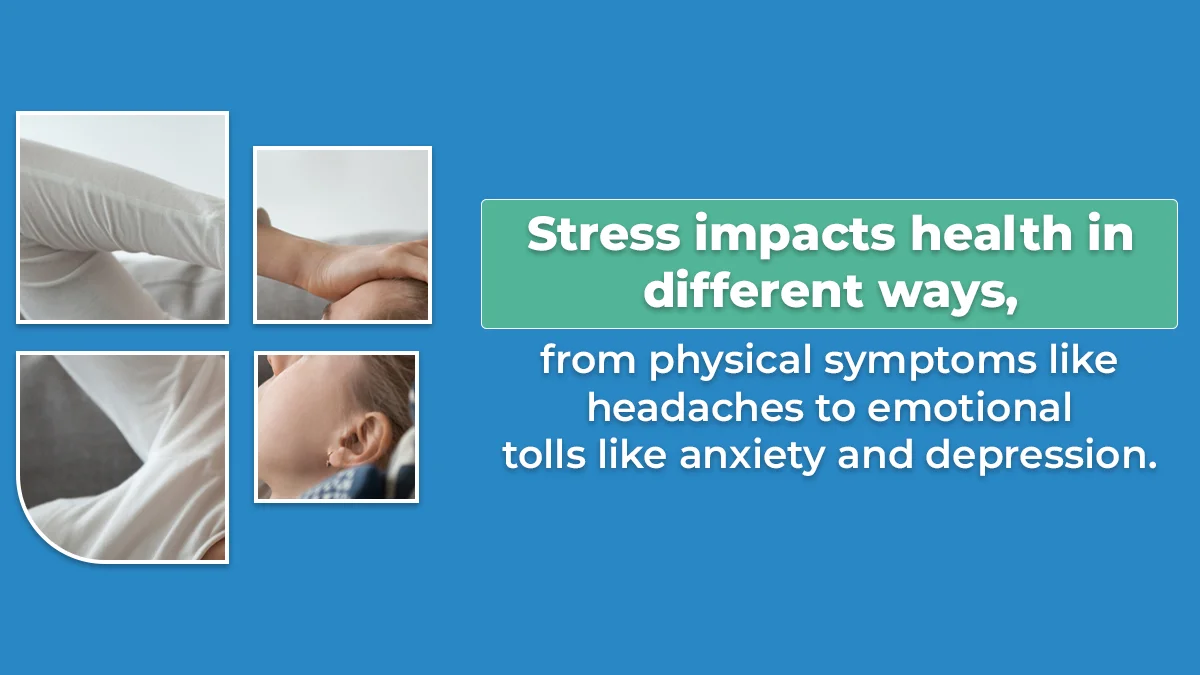Coping With Stress: A Guide to Healthier Living
In a fast-paced world, stress has become a common companion for many, impacting both mind and body. Stress can significantly disrupt our well-being, from the physical toll on our bodies to the emotional symptoms it triggers.
This article will provide insights into the complex relationship between stress and health, highlighting its short-term and long-term effects. It also provides practical coping strategies for identifying stressors and managing stress.
Key Takeaways
Stress is the leading cause of mental illnesses in the United States. Here is what this article discusses:
- Stress impacts both mental and physical health and, eventually, immune function.
- Long-term stress can lead to various health issues and mental health disorders.
- Effective stress management involves recognizing triggers and seeking support.
If stress impacts your well-being, choose The Recovery Team as your partner through your healing journey. Contact us at (800) 8171247 for further support.
Understanding Stress
Stress is a feeling of pressure or tension from different life situations. It’s like when you have too much to do and insufficient time to do it. Stress can be caused by schoolwork, problems with friends or family, or feeling overwhelmed by everything around you.
When stressed, your body releases hormones like adrenaline, making you anxious or on edge. This can affect your mood, ability to maintain focus, and even your physical health if it lasts for a long time.
Finding ways to manage stress is important, like taking breaks, talking to someone you trust, or practicing relaxation tools like deep breathing or meditation. By managing stress, you can feel more in control and better handle whatever comes your way.
The Link Between Stress and Health
Stress can affect your health. When you’re stressed, your heart beats faster, and your breathing speeds up. Over time, this can cause problems like high blood pressure and trouble sleeping. Stress can make it harder for your body to fight off sickness so you might get sick more often.
But it’s not just your body that feels the adverse effects of stress. Your mind can suffer, too. Different types of stress can make concentrating harder, and you might feel more anxious or sad. Long-term stress can even lead to mental health issues like depression.
That’s why it’s important to find ways to manage stress. Exercise, spending time with close friends and family, and doing things you enjoy can all help. And if you’re struggling, talking to a trusted adult or counselor can make a big difference. Taking care of your stress can help you stay healthier and happier overall.
Short-Term Impact of Stress on Health
The impact of short-term stress on health can be significant and affect various aspects of physical and mental health conditions. Here are some key effects:
Physical Effects of Stress
When stress hits, its response can mess with your body in many ways. Your heart may start racing, your muscles may tense up, and your stomach might feel tied in knots. These physical reactions are your body’s way of preparing to face a challenge or run away from danger.
Emotional Impact of Stress
Stress doesn’t just affect your body; it can mess with your emotions, too. You might feel anxious, irritable, or even sad when stress takes over. It can make it hard to concentrate on tasks or enjoy the things you used to love. Sometimes, stress can even lead to feelings of being overwhelmed or hopeless.
Cognitive Consequences of Stress
Stress threatens cognitive processes when it makes it tough to think straight. Stress can also make it harder to focus and pay attention, affecting your performance in school or work. It’s like your brain gets all tangled up in worry, making it harder to untangle the mess.
Long-Term Impact of Stress on Health
Stress isn’t just a feeling; it can affect the human body in big ways. Let’s explore how long-term stress can impact overall health and what we can do to lead happier, healthier lives.
Physical Effects
Long-term or severe stress can result in headaches, muscle tension, and stomach problems. It can weaken our immune system, making us more prone to getting sick, so caring for our bodies is crucial for overall well-being.
Mental Effects
Chronic stressors can make it hard to concentrate and remember things. It might even contribute to mental health problems like depression, panic attacks, or anxiety disorders, which is why seeking support from a friend, family, or professionals is essential for mental well-being.
Behavioral Effects
When we’re stressed for a long time, we might start to cope in unhealthy ways, like overeating, not sleeping enough, or turning to substances like alcohol or drugs. Finding healthy coping mechanisms and self-care practices is crucial for maintaining balanced behaviors.
Management and Coping Strategies for Stress
Managing and coping with stress is essential for maintaining overall well-being and productivity. Here are some strategies to help manage and cope with stress effectively:
Recognizing Stress
Identifying causes of stress, like deadlines, conflicts, or workload, is the basic step in managing stress effectively. Notice physical signs like headaches or stomach aches, which can indicate heightened stress levels that need attention. Taking proactive steps to address these triggers can prevent stress from escalating.
Time Management
Break tasks into smaller ones to make them more manageable and less overwhelming. Use planners or apps to organize tasks and prioritize them based on importance and deadlines, ensuring a smoother work-life balance.
Setting realistic goals and deadlines can assist you in staying focused and motivated. Regularly review and adjust your schedule to adapt to changing priorities and circumstances.
Relaxation Techniques
Regularly practice deep breathing, meditation, or progressive muscle relaxation to calm the mind and reduce tension. Take short breaks during the day to recharge and rejuvenate your energy levels effectively. Engaging in activities that bring you joy and peace, such as relaxing in nature or listening to music, can also promote relaxation.
Healthy Lifestyle
Maintaining a healthy diet, physical exercise, and prioritizing sufficient sleep are vital for managing stress. Avoiding excessive caffeine, alcohol, and smoking can also contribute to overall well-being and stress reduction. Hydrating adequately and incorporating mindfulness into daily routines can support a healthy lifestyle.
Setting Boundaries
Learn to say no to extra responsibilities when overwhelmed to prevent burnout. Delegate tasks when possible and communicate limits clearly to maintain a healthy balance in workload and personal life. Establishing boundaries also involves recognizing your own needs and limitations. Prioritize self-care activities and allocate time for relaxation to honor your boundaries and promote overall well-being.
Seeking Support
Talking to friends, family, or counselors about your feelings provides valuable support and perspective. Sharing problems can decrease stress, and people feel more understood and supported. Additionally, joining support groups or virtual communities can introduce you to others experiencing similar challenges.
Positive Outlook
Focus on solutions rather than dwelling on problems to maintain a constructive mindset. Practice gratitude and optimism daily to cultivate resilience and a hopeful attitude towards challenges. Celebrating small victories and milestones can foster a sense of accomplishment and motivation. Additionally, seeking positive affirmations can help reinforce a positive outlook during difficult times.
Hobbies and Interests
Indulge in activities you enjoy to distract from stress and promote relaxation. Hobbies like reading, painting, or sports can provide a sense of fulfillment and joy, helping to alleviate stress and improve overall well-being. Making time for hobbies also allows for self-expression and creativity, contributing to a more balanced and fulfilling life.






